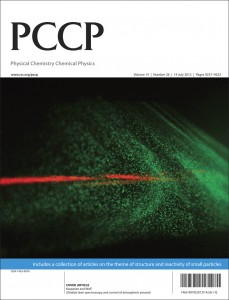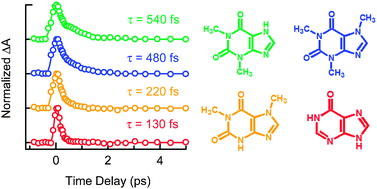 Physical Chemistry Chemical Physics (PCCP) publishes high impact Communications on the most important new research in areas across the broad fields of physical chemistry, chemical physics and biophysical chemistry. PCCP is proud to be a Society journal and is co-owned by 17 national chemical societies.
Physical Chemistry Chemical Physics (PCCP) publishes high impact Communications on the most important new research in areas across the broad fields of physical chemistry, chemical physics and biophysical chemistry. PCCP is proud to be a Society journal and is co-owned by 17 national chemical societies.
Now PCCP’s Accepted Manuscript service means your research is available, in citable form, on average within one day of acceptance.
Choose to submit to one of our Associate Editors: Katsuhiko Ariga (NIMS, Japan), Hedi Mattoussi (Florida State University), Frank Neese (Max-Planck Institut für Bioanorganische Chemie, Germany) and Seong Keun Kim (Seoul National University, Korea) or to the Cambridge Editorial office.
Submit your best research today.
Read a selection of our high impact Communications:
The development of direct multicolour fluorescence cross-correlation spectroscopy: Towards a new tool for tracking complex biomolecular events in real-time
Holly M. Wobma, Megan L. Blades, Ekaterina Grekova, Dylan L. McGuire, Kun Chen, Warren C. W. Chan and David T. Cramb
DOI: 10.1039/C2CP23278B
Mesoporous carbon capsules as electrode materials in electrochemical double layer capacitors
Shanthi Murali, Daniel R. Dreyer, Patricia Valle-Vigón, Meryl D. Stoller, Yanwu Zhu, Cornelio Morales, Antonio B. Fuertes, Christopher W. Bielawski and Rodney S. Ruoff
DOI: 10.1039/C0CP02557G
Layering and shear properties of an ionic liquid, 1-ethyl-3-methylimidazolium ethylsulfate, confined to nano-films between mica surfaces
Susan Perkin, Tim Albrecht and Jacob Klein
DOI: 10.1039/B920571C
Nanoparticle-coated separators for lithium-ion batteries with advanced electrochemical performance
Jason Fang, Antonios Kelarakis, Yueh-Wei Lin, Chi-Yun Kang, Ming-Huan Yang, Cheng-Liang Cheng, Yue Wang, Emmanuel P. Giannelis and Li-Duan Tsai
DOI: 10.1039/C1CP22017A
A liposome-based energy conversion system for accelerating the multi-enzyme reactions
Ryuhei Matsumoto, Masaya Kakuta, Taiki Sugiyama, Yoshio Goto, Hideki Sakai, Yuichi Tokita, Tsuyonobu Hatazawa, Seiya Tsujimura, Osamu Shirai and Kenji Kano
DOI: 10.1039/C0CP00556H
2D assembly of gold–PNIPAM core–shell nanocrystals
Sarah Jaber, Matthias Karg, Anthony Morfa and Paul Mulvaney
DOI: 10.1039/C0CP02494E
CVD graphene electrochemistry: the role of graphitic islands
Dale A. C. Brownson and Craig E. Banks
DOI: 10.1039/C1CP21978B
The importance of surface morphology in controlling the selectivity of polycrystalline copper for CO2 electroreduction
Wei Tang, Andrew A. Peterson, Ana Sofia Varela, Zarko P. Jovanov, Lone Bech, William J. Durand, Søren Dahl, Jens K. Nørskov and Ib Chorkendorff
DOI: 10.1039/C1CP22700A
In silico free energy predictions for ionic liquid-assisted exfoliation of a graphene bilayer into individual graphene nanosheets
Gary A Baker
DOI: 10.1039/C2CP40824D
Electrospinning of chitosan derivative nanofibers with structural stability in an aqueous environment
Ashleigh Cooper, Narayan Bhattarai, Forrest M. Kievit, Michael Rossol and Miqin Zhang
DOI: 10.1039/C0CP02909B
Visualisation of electrochemical processes at optically transparent carbon nanotube ultramicroelectrodes (OT-CNT-UMEs)
Agnieszka Rutkowska, Tahani M. Bawazeer, Julie V. Macpherson and Patrick R. Unwin
DOI: 10.1039/C0CP02804E
Strong location dependent surface enhanced Raman scattering on individual gold semishell and nanobowl particles
Jian Ye, Chang Chen, Liesbet Lagae, Guido Maes, Gustaaf Borghs and Pol Van Dorpe
DOI: 10.1039/C0CP00872A
Nanoreactors’ for photocatalytic H2 evolution in oil–water biphase systems
Jiehua Liu, Xiangfeng Wei, Yaolun Yu, Xin Wang, Wei-Qiao Deng and Xue-Wei Liu
DOI: 10.1039/C0CP01396J
Fluorescence energy transfer efficiency in labeled yeast cytochrome c: a rapid screen for ion biocompatibility in aqueous ionic liquids
Sheila N. Baker, Hua Zhao, Siddharth Pandey, William T. Heller, Frank V. Bright and Gary A. Baker
DOI: 10.1039/C0CP02345K
Impact of surface mechanics on the reactivity of electrodes
J. Weissmüller, R. N. Viswanath, L. A. Kibler and D. M. Kolb
DOI: 10.1039/C0CP01742F
On the proton conductivity in pure and gadolinium doped nanocrystalline cerium oxide
Mona Shirpour, Giuliano Gregori, Rotraut Merkle and Joachim Maier
DOI: 10.1039/C0CP01702G
Salting out in organic solvents: a new route to carbon nanotube bundle engineering
Maxim V. Fedorov, Raz N. Arif, Andrey I. Frolov, Martin Kolar, Anastasia O. Romanova and Aleksey G. Rozhin
DOI: 10.1039/C1CP21440C
Electrical conductivity in patterned silver–mesoporous titania nanocomposite thin films: towards robust 3D nano-electrodes
Eduardo D. Martínez, Leticia Granja, Martín G. Bellino and Galo J. A. A. Soler-Illia
DOI: 10.1039/C0CP00824A
Charge transfer kinetics in CdSe quantum dot sensitized solar cells
Eugenia Martínez-Ferrero, Ivan Mora Seró, Josep Albero, Sixto Giménez, Juan Bisquert and Emilio Palomares
DOI: 10.1039/B924970B
“Cosmetic electrochemistry”: the facile production of graphite microelectrode ensembles
Nadeem A. Choudhry, Rashid O. Kadara and Craig E. Banks
DOI: 10.1039/B923246J
Dielectrophoretic trapping of DNA-coated gold nanoparticles on silicon based vertical nanogap devices
Sebastian Strobel, Ralph A. Sperling, Bernhard Fenk, Wolfgang J. Parak and Marc Tornow
DOI: 10.1039/C0CP02718A
Nitrogen-doped coatings on carbon nanotubes and their stabilizing effect on Pt nanoparticles
Xenia Tuaev, Jens Peter Paraknowitsch, René Illgen, Arne Thomas and Peter Strasser
DOI: 10.1039/C2CP40760D
Application of surface enhanced Raman spectroscopy to the study of SOFC electrode surfaces
Xiaxi Li, Kevin Blinn and Meilin Liu
DOI: 10.1039/C2CP40091J
You can find many more excellent Communications on our website.














 We are delighted to announce that
We are delighted to announce that 

